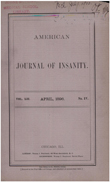Hypothalamic-pituitary-adrenocortical activity and response to cognitive behavior therapy in unmedicated, hospitalized depressed patients
Abstract
OBJECTIVE: Surprisingly little research supports the hypothesis that depressions characterized by objective measures of neurobiological dysregulation respond poorly to psychotherapy. Moreover, relevant studies testing this hypothesis have been compromised by low rates of neurobiological abnormality in outpatient samples. The authors therefore investigated response to cognitive behavior therapy in relation to pretreatment measures of hypothalamic-pituitary- adrenocortical (HPA) activity in hospitalized, yet unmedicated, patients. METHOD: The subjects were 29 unmedicated, hospitalized patients with major depression (DSM-III-R and Schedule for Affective Disorders and Schizophrenia/Research Diagnostic Criteria), nonpsychotic/nonbipolar subtype. After a 7- to 14-day evaluation, urinary free cortisol levels and dexamethasone suppression tests (DSTs) were obtained. Patients were treated for an average of 3 weeks with intensive individual cognitive behavior therapy. Response was assessed in relation to clinical severity of illness and pretreatment HPA parameters. RESULTS: Response to inpatient cognitive behavior therapy was inversely associated with pretreatment urinary free cortisol concentrations, although not strongly correlated with DST results. Overall, 12 (92%) of 13 cortisol suppressors on the DST who had normal urinary free cortisol concentrations responded to treatment, compared with only seven (44%) of the 16 patients characterized by nonsuppression of cortisol and/or elevated urinary free cortisol excretion. The relation between response to cognitive behavior therapy and HPA activity was not explained by clinical measures of symptom severity. CONCLUSIONS: Results are consistent with the hypothesis that patients with increased HPA function are less responsive to psychotherapy and, hence, might require somatic interventions. It is proposed that the negative impact of hypercortisolism on neurocognitive function mediates this relationship.
Access content
To read the fulltext, please use one of the options below to sign in or purchase access.- Personal login
- Institutional Login
- Sign in via OpenAthens
- Register for access
-
Please login/register if you wish to pair your device and check access availability.
Not a subscriber?
PsychiatryOnline subscription options offer access to the DSM-5 library, books, journals, CME, and patient resources. This all-in-one virtual library provides psychiatrists and mental health professionals with key resources for diagnosis, treatment, research, and professional development.
Need more help? PsychiatryOnline Customer Service may be reached by emailing [email protected] or by calling 800-368-5777 (in the U.S.) or 703-907-7322 (outside the U.S.).



